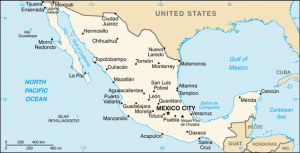As of early August, 650 people had been killed in Acapulco, Mexico in 2011, making it one of the the bloodiest cities in Mexico, due primarily to the drug war. 
As a key passageway for South American cocaine, the city has long attracted drug gangs, with agents of the Sinaloa Cartel battling the Zetas as far back as 2005. Both gangs are targeted in America’s war on drugs, which unfortunately has bolstered their capacities in various ways as they expand their dominance in the black market.
Men from the Zetas gang are suspected of having terrorized and burnt down a crowded casino last week, killing over 50 people. The motivation for the attack is reportedly a failure to pay protection money.
Twenty-three local gasoline stations closed down on Friday to protest against increased extortion demands from these gangs, while authorities reported a 20-fold rise in car robberies along the highway which connects Acapulco to Mexico City. After a series of robberies on shops last week, a handful of jewelers in the city’s downtown announced a weekend shutdown to take a stand against the violence.
The US response to such drug-related violence has been to crackdown and weaponize local armies. But this is counterproductive, as the Zetas gang is tied to US-trained and supported Guatemalan militias notorious for various human rights abuses. Similarly, the Sinaloa Cartel, which US authorities have cooperated with in the past, is involved in the smuggling and distribution of Colombian cocaine, where the US has funded various drug-trafficking militias as well as a corrupt government which has provided protection for such groups.


